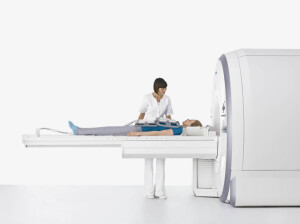por
Brendon Nafziger, DOTmed News Associate Editor | June 10, 2011

The Biograph mMR
(Credit: Siemens)
Siemens Healthcare said Friday its hybrid PET-MRI scanner received Food and Drug Administration clearance.
The device, the Biograph mMR, is the first integrated PET-MR device capable of doing simultaneous whole-body magnetic resonance imaging and positron emission tomography scans, Siemens said. It combines a 3-Tesla MR system with PET detectors, giving doctors the morphological and soft tissue information from MR with the cellular and metabolic activity data from PET.
The FDA said it cleared the device based on bench tests that compared the device with a PET-CT scanner.



Ad Statistics
Times Displayed: 107218
Times Visited: 6551 MIT labs, experts in Multi-Vendor component level repair of: MRI Coils, RF amplifiers, Gradient Amplifiers Contrast Media Injectors. System repairs, sub-assembly repairs, component level repairs, refurbish/calibrate. info@mitlabsusa.com/+1 (305) 470-8013
“Integrating these two powerful modalities into one simultaneous whole-body system represents a breakthrough innovation," Dr. Gregory Sorensen, Siemens Healthcare's
new CEO, said in a statement.
Siemens' product
made its North American debut at the Radiological Society of North America's annual meeting in November, but Siemens
first demonstrated the product four years ago. It
received European Union approval earlier this month.
The hope of the new technology is to provide faster, more accurate cancer diagnosis and staging, as well as to further our understanding of neurological disorders. Siemens said internal tests suggest the device can scan a patient with both imaging types in about half an hour. Normally, sequential imaging with PET and MR scans can take up to an hour, the Malvern, Pa.-based company said.
Siemens said the device got around a problem that prevented the marriage of the two modalities: PET detectors, which use photomultiplier tubes, normally can't withstand the strong magnetic fields generated by MR magnets.
Nuclear medicine specialists told DOTmed News last year that PET-MR technology could help treatment planning for some soft-tissue tumors, such as those of the brain, liver or lung. It's also hoped that the MRI could be an ionizing-radiation-free alternative to CT in providing attenuation correction for the PET image.
In a statement, the FDA said the device had a significantly lower radiation dose than a PET-CT system, which could be especially significant for children or those receiving multiple scans.
A study presented at the Society of Nuclear Medicine's annual meeting last week found Siemens' device
performed comparably in detecting tumors when matched against a PET-CT scanner, but many researchers believe more work is needed to validate the new modality.
A PET-MR scanner made by rival electronics giant Philips Healthcare
received EU marketing approval earlier in the year. The Ingenuity TF PET-MR scanner features a rotating turntable, letting patients connect with separate MRI and PET scanners.

